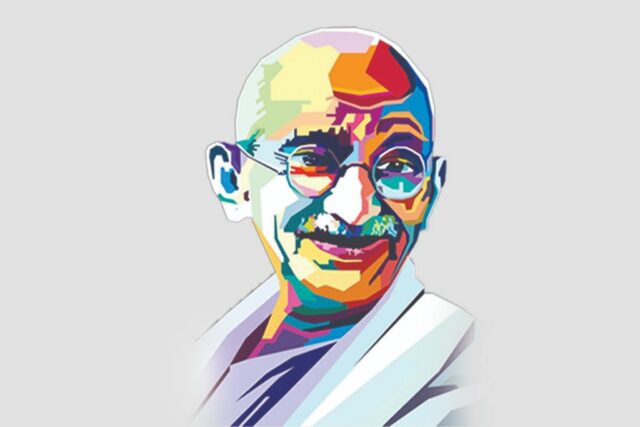2nd October, the birth anniversary of “Father of the Nation”, Mohandas Karamchand Gandhi, is celebrated as Gandhi Jayanti every year. The day is also celebrated as the International Day of Non-Violence, declared by the United Nations General Assembly on 15 June 2007. Gandhi Jayanti, is an occasion to spread the message of non-violence in quest for secure and peaceful culture. Through the years, many prominent leaders have utilised non-violent methods to bring positive change in the mindset of humans across the globe. Some of them are Martin Luther King, the Dalai Lama and Gautam Buddha. But, the most well-known agent of change using non-violent methods is Mahatma Gandhi. In fact, Gandhi popularly known as ‘Bapu’ influenced the United Nations to create the International Day of Non-Violence. It was also this non-violent efforts of Bapu that helped India gain independence in 1947.
Gandhi’s philosophy of non-violence remains of profound guidance in a world where differences are more easily augmented and people take offence of misdemeanor more easily. During India’s struggle for freedom, Gandhi showed the world that freedom can be achieved peacefully through the path of non-violence. He won rights for the 75,000 Indians living in South Africa without using violent means. Gandhi was of the belief that people could never win their rights through violence, thus, he used a new form of protest popularly known as “Satyagraha” – derived from Sanskrit words meaning “truth” and “force.” Among the many peaceful civil rights movements he started was the Dandi March where he protested against the salt tax imposed by the British in 1930. He also protested during the Quit India movement in 1942 calling for the British to leave India. By assuming leadership of INC in 1921, he led nationwide campaigns for various social causes with an aim to achieve Swaraj or self-rule. The most well-known contributions of Mahatma Gandhi in India’s non-violent civil rights movement to attain freedom were the Champaran and Kheda Satyagraha, Non-cooperation movement, Salt Satyagraha and Quit India movement. Secularism is yet another contribution of Gandhi. He believed that there should be no monopoly of a religion on truth. Gandhi evidently promoted and encouraged friendship between different religions. As he influenced many international leaders around the world, his struggle became an inspiration for leaders like “Martin Luther King Jr., James Beve, and James Lawson”. Furthermore, Gandhi influenced Nelson Mandela for his freedom struggle. Also, Lanza del Vasto came to India to live with Gandhi. As we know that the United Nations has greatly honored Mahatma Gandhi by recognising 2nd October as “the International Day of Non-violence”, many countries also observe 30th January as School Day of Nonviolence and Peace. The awards given to Mahatma Gandhi are too many to discuss, and there are very few nations which have not awarded Mahatma Gandhi for his philosophy and methods of teachings.
Today, the universe is filled with a superfluity of conflicts. Consequently, in times of conflict and crisis Gandhi’s emphasis on universal brotherhood and peaceful co-existence has all time relevance. His teachings are thus, the most validated principles of patriotism as it focuses on ways and means to end various global conflicts. In fact, a true testimony of Gandhi’s teaching lies in the fact that mere “good ends” do not justify ‘bad’ means. The world over therefore, today the emphasis is on human dignity and upholding the values of natural justice. It is obvious that in today’s world, nothing seems to be permanent except the ‘crisis of peace’ – and nothing would be a better tribute to this man than to re-dedicate ourselves towards the cause of ‘peace’ and mutual tolerance.
In conclusion, it would not be an exaggeration to say that Mahatma Gandhi was one of the greatest political icons ever. There are several reasons for Indians to have a high opinion of him and describe him as the “father of the nation”. The name Mahatma Gandhi will unquestionably remain immortal for all generations.









